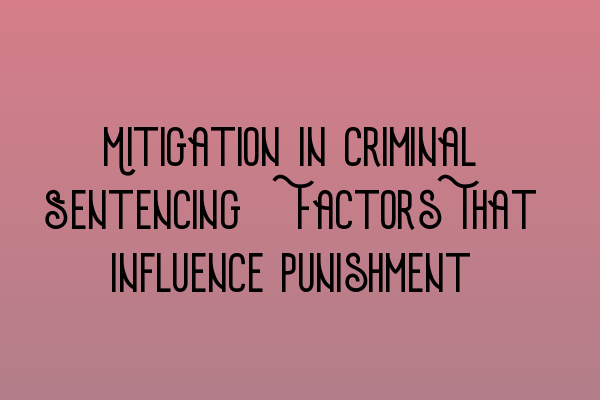Mitigation in Criminal Sentencing: Factors That Influence Punishment
When it comes to criminal sentencing, the court takes various factors into consideration to determine the appropriate punishment for a crime committed. One crucial aspect of this process is mitigation, which refers to factors that can reduce the severity of a sentence. In this blog post, we will discuss the importance of mitigation in criminal sentencing and explore the key factors that influence punishment.
Mitigation plays a significant role in the criminal justice system as it recognizes that not all criminal acts are equal. It acknowledges that there may be underlying circumstances that mitigate the offender’s culpability or warrant a more lenient sentence. By taking these factors into account, courts strive to deliver fair and just sentences that consider the unique circumstances of each case.
One of the primary factors that influence punishment in criminal sentencing is the defendant’s level of remorse. Expressing genuine remorse for one’s actions demonstrates an acknowledgment of wrongdoing and a desire to make amends. Courts often view remorse as a sign of rehabilitation potential, which can result in a more lenient sentence. It is important for the defense solicitor to emphasize the defendant’s remorse when presenting their case in court.
Cooperation with law enforcement and the justice system is another key factor that can influence punishment. If the defendant cooperates fully during the investigation, provides helpful information, or assists in the prosecution of others involved in the criminal act, this can be seen as a mitigating factor. Cooperation demonstrates a willingness to accept responsibility and make a positive contribution towards resolving the case, which can lead to a reduction in sentencing.
Another factor courts consider is the defendant’s personal circumstances. This includes factors such as their age, mental health, and prior criminal history. Young offenders or individuals with mental health issues may receive more lenient sentences, as the court recognizes the potential for rehabilitation and the need for appropriate rehabilitation measures. A clean criminal record can also be a mitigating factor, as it suggests that the defendant’s involvement in the criminal act is an isolated incident.
The presence of any mitigating circumstances directly related to the offense is also crucial. These circumstances may include the absence of premeditation, the existence of provocation or self-defense, or a genuinely held belief that the actions were necessary. By highlighting these factors, a defense solicitor can advocate for a reduced sentence, reflecting the mitigating circumstances surrounding the offense.
Factors such as cooperation during the legal proceedings, participation in rehabilitative programs, and a commitment to reform are additional considerations that can influence punishment. These actions demonstrate a proactive approach towards addressing the harm caused by the offense and minimizing the likelihood of future criminal behavior. By pointing out these factors, a solicitor can argue for a more lenient sentence, highlighting the potential for the defendant’s rehabilitation and reintegration into society.
It should be noted that the weight given to each mitigating factor and its ultimate impact on the sentence is at the discretion of the presiding judge. The court will carefully assess all relevant factors presented by the defense and prosecution before making a final decision.
In conclusion, mitigation plays a crucial role in criminal sentencing as it allows courts to consider the unique circumstances of each case and determine an appropriate punishment. Factors such as remorse, cooperation, personal circumstances, and the presence of any mitigating circumstances directly related to the offense all influence the severity of the sentence imposed. By effectively presenting these factors to the court, a skilled defense solicitor can advocate for a reduced sentence that reflects the defendant’s individual circumstances and promotes justice.
